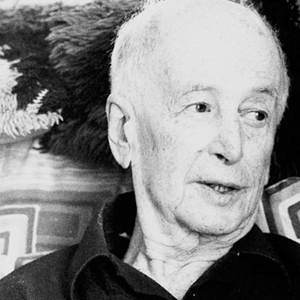Yosl Birstein was such a terrific storyteller, both in Yiddish and in Hebrew, that he eventually became a legendary figure on the Israeli radio.
Yossel Birstein, writer: born Biala-Podolsk, Poland 24 September 1920; married 1941 Margaret Waisberg (two daughters); died Jerusalem 28 December 2003.
Even on his deathbed Yossel Birstein couldn’t stop talking. No longer able to write, he called his granddaughter to his side (in biblical fashion), and began to dictate the story of his journey around the world, from the past to the future, from Poland to Australia.
The year was 1937, Yossel Birstein was 17. He would see no more of Biala-Podolsk, the shtetl in which he was born and raised, or his family. Thereafter they would exist only in his memory and his stories. His travelling companion, lifelong friend and exact contemporary was Yosl Bergner (soon to be a famous painter). It was hardly a ship of fools – the passengers had the good sense to be quitting Europe – but it was a ship of innocents.
At a stop-off in Tahiti, the Jewish tailors and boot-makers refused to eat the sanguinary meat. They sent a letter to the celebrated Yiddish poet Melech Ravitch (Yosl Bergner’s father), demanding gefilte fish and other kosher delicacies. It was addressed, “From the Pacific to Australia”. “You are wasting your time,” observed Birstein, more practical than the others, “Melech Ravitch is a vegetarian.” On one of the lesser islands Bergner was overcome by malaria, and Birstein (small, but strong) carried him back on board.
Together they passed through the Panama Canal; together they enlisted in the Australian army. Then, in 1950, with antipodean wives, they made their separate ways to the new state of Israel. Birstein was waiting for Bergner in Haifa. “Behold,” he said, “the new Jew.”
Yossel Birstein spent the next decade on Kibbutz Gvat working as a shepherd, an occupation that offered plenty of time to think. He had always fancied himself as a poet, but finally he opted for unbroken lines. In 1958 he published his first book, Oyf shmole trotwarn (“Narrow Paths”), at that time the only novel about kibbutz life written in Yiddish.
Although he was using the language of old Europe, he did not look back. He only did that, paradoxically, when he switched to Hebrew. Then he felt free to roam the three continents in which he had dwelt. This is particularly true of his last novel, Al Tikra li Job (1995, translated into English as Don’t Call Me Job by his wife, Margaret), in which Polish, Australian, and Israeli lives all intersect. One of these multi-national characters, I’m proud to say, bears my name (though he has more of Bergner’s character).
I met Birstein in Jerusalem. By then he was herding papers rather than sheep, being the cataloguer of Melech Ravitch’s three-ton archive at the Hebrew University. He took me to see it; stack after stack, all filled with boxes, like a gigantic shoeshop. Each box a life. Birstein knew them all, and a hundred stories about each of them. He was a raconteur of genius. One by one they returned from the other side, those dreamers of a lost world. It was inevitable that Birstein would make use of such a goldmine. Panim Be’anan (“A Face in the Cloud”) came out in 1991.
But it was as a storyteller and raconteur that Yossel Birstein found his greatest popularity. And not only in Israel (where he was awarded both the Manger Prize and the Prime Minister’s Prize). In his old age he became a star in China, where the oral tradition remains strong. So long as he was able, he would wander the streets of Jerusalem and ride its buses, always looking for and finding stories. The stories were often tragic, but to tell them was always an act of optimism. Thank God he wrote so many of them down.
In the end he whispered to his daughter: “Words, words, words . . . and more words.”


10 thoughts on “Kaminos”
Was Nicholas related to Alexander Saslavsky who married Celeste Izolee Todd?
Anyone have a contact email for Yair Klinger or link to score for Ha-Bayta?
wish to have homeland concert video played on the big screen throughout North America.
can organize here in Santa Barbara California.
contacts for this needed and any ideas or suggestions welcomed.
Nat farber is my great grandpa 😊
Are there any movies or photos of max kletter? His wife’s sister was my stepmother, so I’m interested in seeing them and sharing them with his wife’s daughter.
The article says Sheb recorded his last song just 4 days before he died, but does not tell us the name of it. I be curious what it was. I’d like to hear it.
Would anyone happen to know where I can find a copy of the sheet music for a Gil Aldema Choral (SATB) arrangement for Naomi Shemer’s “Sheleg Al Iri”. (Snow on my Village)?
Joseph Smith
Kol Ram Community Choir, NYC
שלום שמעון!
לא שכחתי אותך. עזבתי את ישראל בפברואר 1998 כדי להביא את בני האוטיסט לקבל את העזרה המקצועית שלא הייתה קיימת אז בישראל. זה סיפור מאוד עצוב וטרגי, אבל אני הייתי היחיד עם ביצים שהביא אותו והייתי הורה יחיד בשבילו במשך חמישה חודשים. הוא היה אז בן 9. כעת הוא בן 36 ומתפקד באופן עצמאי. נתתי לו הזדמנות לעתיד נורמלי. בטח, אבות כולם חרא, אומרים הפמינציות, אבל כולם צריכים לעבוד כמטרות במטווחי רובה!
משה קונג
(Maurice King)
Thank you for this wonderful remembrance of Herman Zalis. My late father, Henry Wahrman, was one of his students. Note the correct spelling of his name for future reference. Thank you again for sharing this.
Tirza Wahrman (Mitlak)
amazing zchuso yagein aleinu, he wrote the famous niggun Lefichuch that is sung in almost every Israeli Yeshiva